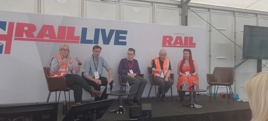Tackling climate change and the future of sustainability for rail was the subject of one of day one’s keynote panel discussions.
With a full panel of representatives from across the industry, sustainability and how it weaves into the wider industry culture formed a key part of the debate.
For some, there is a little too much tokenism and not enough action, according to Railway Mission’s Chaplain, Mike Roberts. “There is a fatigue a little with short-term goals with climate change and sustainability, and it’s about making it more than just tokenism.”
This feeling was echoed by Rail Forum’s Chief Executive, Elaine Clark, who added that the industry was feeling a little frustrated with the lack of progress currently taking place within the industry, adding “If there is progress, it isn’t quick enough in some areas.”
Although it is a key focus for many, it’s important to ensure that sustainability remains a core focus within decision-making and not just a footnote in tender documents. “It’s a challenge for sure” said Casper Lucas, Technical Director, AtkinsRealis Rail Consulting.
And some of the issues lie in the tendering process argued Clark, adding “For the industry, tendering is very transactional, and the opportunity to have a proper dialogue for the end user and the supplier to discuss how best to deliver the optimal product is not always there. So, sustainability can sometimes get lost in that lack of discussion.”
But climate change, and rail’s role in ensuring that the industry is around and thriving for years to come, affects the whole industry – from the wider supply chain and organisational structures in rail to the manufacturers and policy makers ensuring the trains keep running. And this will be the next generation’s responsibility.
It’s a hugely important topic and many of the younger generation have real climate anxiety according to Julianna Moats, national communications manager for Young Rail Professionals.
“Young people have climate anxiety and have expectations on how companies and the industry are tackling biodiversity and sustainability. In large projects, especially HS2, it is intrinsically linked, and it helps people understand and feel the industry is listening” she told the audience.
“There is always more we can do though” according to Roberts, who also told the audience that one of the most important challenges within climate change is longevity and understanding how it is more than just initiatives and programmes and more about culture change.
“That must change. Long-term thinking and a culture change needs to happen,” he warned.
As the talk closed, focus turned to rolling stock and electrification. Thinking in blocks of time rather than thinking of real solutions that could happen now was sometimes a hindrance according to Lucas.
He told the audience, “There is a way of getting to where you want to be with rolling stock without being constricted by blocks of time. You can instruct rolling stock suppliers to build with future electrification in mind. Even if it is not there right now.”
The challenges of long-term thinking, the reality of competing interests and ensuring the younger generation within rail are engaged and involved with sustainability within rail is clearly a constant challenge but change is possible, the panel concluded, while all agreed that the pride in working in rail would see sustainability continue to be a focus in the future.















Login to comment
Comments
No comments have been made yet.